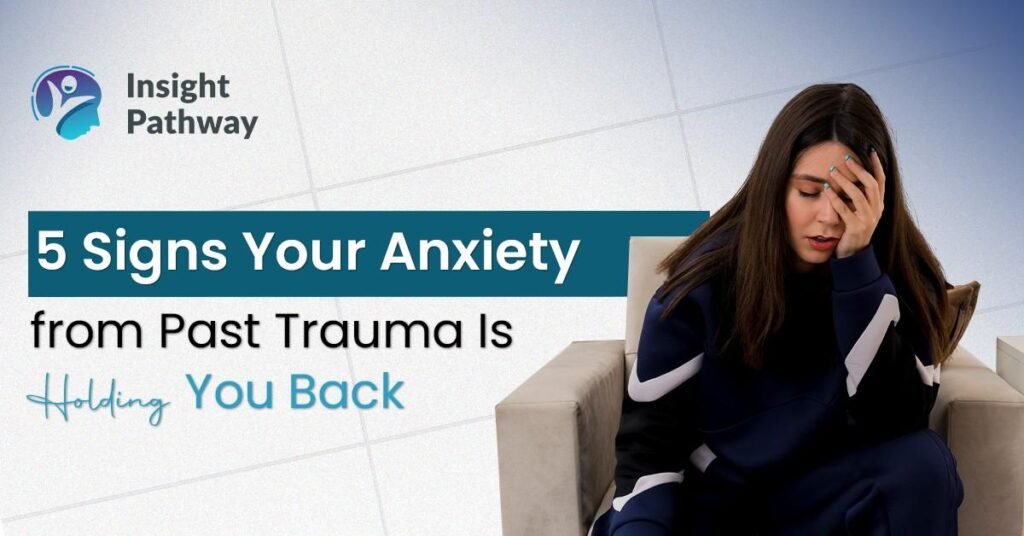We often think anxiety comes from stress, overthinking, or daily challenges, but sometimes, the real cause runs deeper.
If you find yourself feeling anxious without a clear reason, constantly on edge, or struggling to trust others, your anxiety from past trauma might be at play.
Past trauma can stay stored in your body and mind, shaping the way you think, react, and connect with people. Even if you’ve “moved on,” those unhealed experiences can quietly influence how you live and love today.

Let’s break down five signs your anxiety from past trauma might be holding you back, and what you can do to begin emotional healing.
1. You Overthink Everything, Especially When You Feel Unsafe
When you’ve been through painful experiences, your brain learns to stay alert.
That means you might replay conversations, analyze people’s tone, or imagine worst-case scenarios, not because you’re dramatic, but because your body is trying to protect you.
This trauma-based anxiety keeps you stuck in survival mode. You feel anxious even when there’s no real threat. Over time, it can lead to exhaustion, burnout, and constant self-doubt.
Try this: When you catch yourself spiraling, pause and ask, “Is this fear from now, or from then?” That small question helps you separate the present moment from your past.
2. You Struggle to Trust People (Even When They Haven’t Hurt You)
If you’ve experienced betrayal, neglect, or emotional harm, trusting others can feel dangerous.
Your mind says, “Don’t get too close,” while your heart craves connection. This internal conflict fuels anxiety from past trauma, especially in relationships.
You might:
- Expect people to leave or disappoint you
- Push others away when things get serious
- Need constant reassurance that someone cares
This isn’t about being “too sensitive.” It’s your nervous system remembering what it was like to feel unsafe, and doing everything it can to prevent it from happening again.
3. You Have Intense Reactions to Small Things
Have you ever felt your heart race or your stomach tighten over something minor, like a delayed text or a disapproving look?
That’s often an emotional trigger connected to trauma and anxiety.
Your body reacts as if the past event is happening again, even though logically, you know it’s not.
It’s not about overreacting, it’s about unprocessed trauma trying to find a way out.
Example:
If you grew up being ignored or criticized, a small sign of disapproval today can trigger anxiety or panic. Your body is trying to protect you from pain it once felt powerless against.
Healing tip: Notice the physical sensations (tight chest, clenched jaw, racing thoughts). Gently remind yourself: “This is an old feeling. I’m safe now.”
4. You Feel Numb or Detached from Your Emotions
Not everyone with anxiety from past trauma feels anxious all the time, some feel nothing at all.
You might shut down emotionally, struggle to feel joy, or “go blank” when something upsetting happens.
This is your body’s way of coping. When pain becomes too much, the nervous system numbs itself as protection. But in doing so, it also blocks out positive emotions like love, peace, and excitement.
Emotional healing starts by gently reconnecting to how you feel, without judgment.
Small steps like journaling, mindful breathing, or therapy can help you safely explore what’s under the surface.
5. You Sabotage Good Things Because They Feel Unfamiliar
Here’s a tough truth: Sometimes, peace feels uncomfortable when you’ve lived in chaos.
You might self-sabotage healthy relationships, job opportunities, or personal growth, not because you don’t want them, but because your nervous system is used to dysfunction.
When calm feels “boring” or “too good to be true,” that’s a sign your trauma-based anxiety is still running the show.
Recognizing this pattern is powerful. It means you’re becoming aware, and awareness is the first step toward change.
How to Begin Healing Anxiety from Past Trauma
Healing doesn’t mean forgetting what happened, it means teaching your mind and body that you’re safe now.
Here are a few gentle ways to start your emotional healing journey:
- Practice self-awareness – Notice when your reactions don’t match the situation.
- Ground yourself – Use deep breathing, sensory exercises, or mindfulness to calm your body.
- Seek therapy – Trauma-informed therapy or EMDR can help release stored emotional pain.
- Build safety – Surround yourself with people who make you feel seen, not judged.
- Be patient – Healing trauma and anxiety takes time, and celebrate small progress.

Final Thoughts
Your anxiety from past trauma doesn’t define who you are, it’s simply a signal that something within you still needs care and understanding.
By noticing the signs, naming what’s really going on, and choosing healing one step at a time, you give yourself the freedom to live without fear controlling you.
Remember: You don’t have to do it alone. Emotional healing is possible, and you deserve it.



